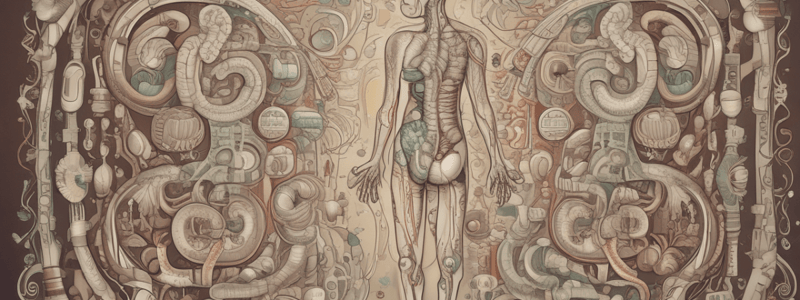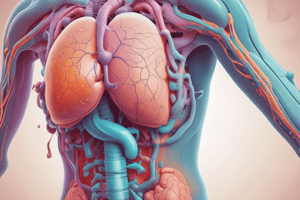Podcast
Questions and Answers
What is a common cause of gallstones forming and blocking the outlet from the gallbladder?
What is a common cause of gallstones forming and blocking the outlet from the gallbladder?
- Diabetes
- Obstructing gallstones (correct)
- Alcohol abuse
- Increased pressure on the rectum
Which of the following conditions is caused by inflammation of the colon?
Which of the following conditions is caused by inflammation of the colon?
- Gastroenteritis
- Ulcerative colitis (correct)
- Diverticulitis
- Irritable bowel syndrome
What is a possible complication of appendicitis?
What is a possible complication of appendicitis?
- Crohn's disease
- An abscess or peritonitis (correct)
- Gastroenteritis
- Kidney stones
What is a common symptom of disease that can cause acute abdomen?
What is a common symptom of disease that can cause acute abdomen?
What is the term for a sudden decrease in kidney function?
What is the term for a sudden decrease in kidney function?
What is a potential consequence of gastroesophageal reflux disease (GERD)?
What is a potential consequence of gastroesophageal reflux disease (GERD)?
What is the underlying cause of peptic ulcer disease?
What is the underlying cause of peptic ulcer disease?
Which of the following conditions can cause severe pain in the upper left and right quadrants?
Which of the following conditions can cause severe pain in the upper left and right quadrants?
What is the term for the condition where the kidneys have lost most of their ability to function?
What is the term for the condition where the kidneys have lost most of their ability to function?
What is the location of the tear in a Mallerie-Weiss syndrome?
What is the location of the tear in a Mallerie-Weiss syndrome?
What is a condition that allows foreign material to accumulate in the abdominal cavity?
What is a condition that allows foreign material to accumulate in the abdominal cavity?
What is the cause of esophagitis?
What is the cause of esophagitis?
Flashcards are hidden until you start studying
Study Notes
Here are the detailed bullet points summarizing the text:
• Any condition that allows foreign material to accumulate in the abdominal cavity can cause peritonitis and acute abdomen. • Acute abdomen can be caused by almost any abdominal problem, including bleeding within the GI tract, which is a symptom of disease rather than the disease itself. • Bleeding in the GI tract can occur in the upper or lower GI tract, and the blood may be dark and tar-like or bright red, depending on the location and severity of the bleeding. • Esophagitis is inflammation of the esophagus, often caused by an infectious process or reflux of gastric secretions, and can lead to heartburn, choking, and bleeding. • Gastroesophageal reflux disease (GERD) occurs when the sphincter between the esophagus and stomach opens, allowing stomach acid to move up into the esophagus, causing heartburn and potentially leading to bleeding. • Peptic ulcer disease is caused by an imbalance between stomach acid and protective layers, leading to ulcers, and can be caused by chronic use of non-steroidal anti-inflammatory drugs, alcohol, and smoking. • Gastritis is caused by the same imbalance, leading to inflammation and potentially bleeding. • Mallerie-Weiss tear is a tear at the junction of the esophagus and stomach, causing severe bleeding and potentially death, and is often associated with alcoholism and eating disorders. • Esophageal varices occur when pressure in the blood vessels surrounding the esophagus increases, causing bleeding, and can be a life-threatening condition. • Hemorrhoids are caused by swelling and inflammation of blood vessels surrounding the rectum, often resulting from conditions that increase pressure on the rectum or irritation of the rectum. • Gallstones can form and block the outlet from the gallbladder, causing pain and potentially leading to inflammation of the gallbladder (cholecystitis). • Pancreatitis has many potential causes, including obstructing gallstones, alcohol abuse, and other diseases, and can cause severe pain in the upper left and right quadrants. • Appendicitis is a frequent cause of acute abdomen, and can cause an abscess or peritonitis, or even shock. • Gastroenteritis is a family of conditions revolving around infection, typically caused by bacteria or viral organisms via contaminated food or water, and can cause diarrhea, vomiting, fever, and dehydration. • Diverticulitis is caused by decreased fiber consumption, leading to increased pressure in the colon, and can cause abdominal pain, fever, and bleeding. • Ulcerative colitis is a chronic inflammatory condition caused by inflammation of the colon, and can cause bloody diarrhea, abdominal pain, joint pain, and skin lesions. • Irritable bowel syndrome (IBS) is characterized by abdominal pain and changes in bowel habits, and can be triggered by stress, large meals, and certain foods. • Crohn's disease is a chronic inflammatory condition that can affect the entire GI tract, causing abdominal pain, rectal bleeding, weight loss, diarrhea, and fever. • Urinary tract infections (UTIs) can develop in the lower or upper urinary tract, and can cause painful urination, frequent urges to urinate, and difficulty in urination. • Kidney stones originate in the renal pelvis and result from an excess of insoluble salts or uric acid as it crystallizes in the urine, and can cause severe pain in the flank or groin. • Kidney disease may be characterized as either chronic or acute, and can be caused by systemic diseases such as diabetes or hypertension, or congenital disorders. • Acute kidney injury (AKI) is a sudden decrease in kidney function, causing an increase in toxins in the blood, and can lead to heart failure, hypertension, and metabolic acidosis if left untreated. • Chronic kidney disease is a progressive and irreversible inadequate kidney function, resulting from permanent loss of nephrons, and can cause systemic complications such as hypertension, heart failure, anemia, and electrolyte imbalances. • End-stage renal disease occurs when the kidneys have lost most of their ability to function, and toxic waste material builds up in the blood, leading to fatal consequences unless treated by dialysis or renal transplantation.
Studying That Suits You
Use AI to generate personalized quizzes and flashcards to suit your learning preferences.




